Fights over charters loom over NASCAR as teams, series await key court rulings

 Business - POSTED: 2025/07/16 13:51
Business - POSTED: 2025/07/16 13:51
 Business - POSTED: 2025/07/16 13:51
Business - POSTED: 2025/07/16 13:51
It’s the summer to sue in NASCAR, the sport where the on-track bumping and banging is in danger of being overshadowed by the action in the courtroom.
Two teams — one owned by retired NBA great Michael Jordan — are suing NASCAR over antitrust allegations. 23XI Racing and Front Row Motorsports are awaiting a federal court ruling before Sunday’s race in Delaware that could impact their ability to compete.
Meanwhile, seven-time champion Jimmie Johnson is battling tiny Rick Ware Racing and his lawyers at Legacy Motor Club went hard at Ware’s attorneys in a Monday hearing.
What is all the fighting about? Charters, which are at the heart of NASCAR’s business model. Having one is vital to a team’s survival.
The legal wrangling is only making the the charters skyrocket in value. When Spire Motorsports debuted in 2019, it had bought a charter for $6 million. Now, one of Spire’s founders brokered the now-disputed deal for Ware to sell one of his two charters to Legacy for $45 million.
Johnson is not enjoying the legal brawling, including the higher-profile antitrust fight. He called on those parties to settle.
“I’m just sitting back watching it all play out, learning a lot about the legal process and the amount of injunctions and appeals that can take place,” Johnson said. “It’s a big game of chess and I’m watching all the strategy that goes into it all.
“I would love to see a settlement of some kind. I really don’t think that getting into a knock-down, drag-out lawsuit is good for anybody.”
23XI and FRM filed a federal antitrust suit against NASCAR last year after they were the only two organizations out of 15 to reject NASCAR’s extension offer on charters.
The case has a Dec. 1 trial date, but in the meantime, the two teams are fighting to be recognized as chartered for the current season, which has 16 races left. A charter guarantees one of the 40 spots in the field each week, but also a base amount of money paid out each week.
Jordan and FRM owner Bob Jenkins won an injunction to recognize 23XI and FRM as chartered for the season, but the ruling was overturned on appeal earlier this month. Both teams were set to be stripped of a combined six charters on Wednesday, which would force them to compete as “open cars.”
Three-time Daytona 500 winner Denny Hamlin co-owns 23XI with Jordan and said they are prepared to send Tyler Reddick, Bubba Wallace and Riley Herbst to the track each week as open teams. But they still filed for a restraining order Monday and claimed that through discovery they learned NASCAR upon revocation planned to immediately begin the process of selling the six charters which would put “plaintiffs in irreparable jeopardy of never getting their charters back and going out of business.”
NASCAR said it has asked multiple times for settlement proposals but heard nothing. NASCAR also has no intention of re-negotiating the charter agreements held by 30 other teams.
Jordan has the money to keep 23XI running without charters, but FRM doesn’t have the same level of funding. Additionally, if the teams aren’t chartered, they will have to qualify on speed each week to make the field.
It won’t be an issue this weekend at Dover as fewer than the maximum 40 cars are entered. But should 41 cars show up anywhere this season, someone slow will be sent home.
“We’re not worried because our cars have the speed. We’ve always said we’re racing no matter what. If we have to race open, we have to race open,” Hamlin said at Sonoma Raceway last weekend. “We worked to get an injunction and obviously feel like Dec. 1 is all that matters.”
This case is actually a dispute over agreed-upon terms for Ware to sell one of his two charters to Johnson and his partners at Knighthead Capital Management.
Ware this season is leasing a charter to RFK Racing and was already under agreement with that team to get the charter back in 2026, then lease RFK its second charter next season. He never had a charter to sell for 2026 unless he ceased operations.
Yet when he signed the contract with Legacy, Ware has said, he didn’t read it through and catch that the sale terms were for next season and not 2027, when he’d have both charters in his possession.
RWR is alleging Legacy pulled a bait-and-switch, and if true, it is on Ware for not seeing it in the contract he signed.
The curveball came when T.J. Puchyr, the Spire co-founder who now acts as a consultant and brokered the deal between Legacy and Ware, said last month he plans to buy Ware’s team. Legacy argued in court Monday it was blindsided by the news, that if Ware is selling then the charter rightfully belongs to them, and they urgently needed depositions before Ware sold his race team out from under them.
It didn’t help when Ware’s lawyers couldn’t answer questions about a potential sale: “I think you need to talk to your client,” the judge told them before warning Ware may be in contempt of court and ordering depositions for later this week.
than $50 million from another party. With NASCAR indicating through discovery in the 23XI/FRM suit that it has interested buyers for the six charters, it is a seller’s market.
Johnson, with financial backing from Knighthead, is certain he will be getting the Ware charter one way or another to expand Legacy to three full-time Cup Series drivers.
“I’m not sure there is a plan B,” Johnson said of his confidence level at winning the case.









